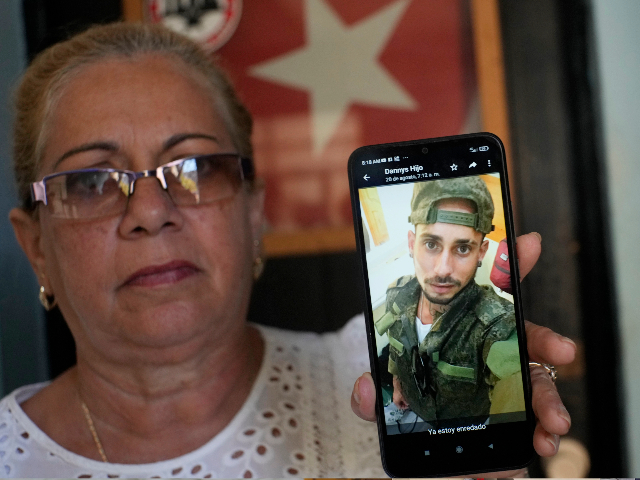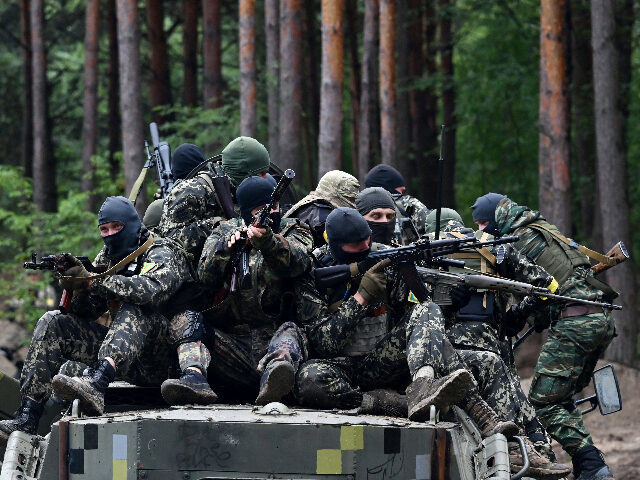Cuba’s communist Castro regime may have sent as many as 14,000 Cuban nationals to fight for Russia in Ukraine between July and August, according to a joint report published Monday by the Madrid-based Cuba Siglo 21 think tank and the Havana Consulting Group.
“All evidence points to a collaborative and concerted effort between the Russian and Cuban governments to organize a recruitment network of Cuban volunteers to join Russian troops in Ukraine,” Cuba Siglo 21 stated on its website.
The organizations reached their conclusion by analyzing data on the 117 flights between Russia and Cuba documented between July and August, at a rate of 13 flights per week.
The flights, according to the report, represented an available seat capacity of 52,497, of which 38,407 were occupied by Russian tourists that traveled to the island nation — 73.16 percent of the available seat capacity.
The analysis concluded that the remaining 26.84 percent of seats may have provided the Castro regime with the operational capacity to transfer up to 14,090 citizens to Russian territory between July and August. Russia is one of the few countries in the world where Cuban citizens do not need to obtain a visitor’s visa to enter.
The Cuba Siglo 21 report concluded, given the totalitarian nature of the Cuban government, that it would be impossible for Cuban nationals to leave or enter the country through any of its airports without being detected — a sign that any Cubans traveling to Russia for alleged military purposes could not do so without the Castro regime’s approval.
Reports of Cuban citizens fighting for Russia in Ukraine first surfaced in May, when the Florida-based news organization Martí Noticias reported that at least 14 Cuban nationals had signed contracts to provide military services to Russia’s armed forces in exchange for a fast track to Russian citizenship, among other benefits.
In late August, two young men claiming to be 19-year-old Cuban citizens trapped in Russia denounced in a video published in Cuban diaspora media that they had been “scammed” into fighting against Ukraine. The men said they had answered an advertisement on Facebook for manual labor jobs in Ukraine and were explicitly told they would, under no circumstances, see the front lines of the war — only to later be forced into military training.
WATCH:
After their video went viral in Spanish-language media, the Castro regime announced last week that it was allegedly working to “neutralize and dismantle” a human trafficking network that recruits Cuban citizens to fight for Russia in Ukraine. The communist External Relations Ministry claimed that the network included Cuban citizens living in Russia “and even some from Cuba.” The Castro regime claims to have so far arrested 17 people involved in the alleged trafficking network.
The report published on Monday suggested that the Castro regime was aware of the trafficking but distanced itself after the fact for geopolitical benefit.
The report also suggested that there is a possibility that the now-allegedly dismantled trafficking network may have been built by the Castro regime as a “smokescreen” and not as the source of Cuba’s main military contribution to Russia, which, according to the think tank, would grant the Castro regime the ability to conceal subsequent dispatches of Cubans to Russia.
Cuba Siglo 21 asserted on its website:
Official Cuban statements claiming to have detected and dismantled this ‘private network’ could henceforth allow Havana to claim that any Cubans identified as fighting in Ukraine were among those who were previously privately recruited on Cuban or Russian territory, behind the back of the Cuban government, and who traveled there before dismantling the network on the island.
“If that is the case – as Cuba Siglo 21 analysts estimate – Havana’s main purpose in having helped this private network and then distancing itself from it was to build a smokescreen, a straw man, to mask the subsequent dispatch of regular forces to Ukraine,” the statement continued. “And such an operation would have been carried out in perfect agreement with Putin.”
The ploy has apparently worked with at least one target: the European Union, one of the Castro regime’s main financiers, which announced on Monday that it accepted and “welcomed” the Castro regime’s efforts to dismantle the alleged human trafficking network.
Last week, the volunteer information website InformNapalm published a full list of names, surnames, dates of birth, and passport details of 199 people — reportedly all Cuban citizens, save for one Colombian citizen — who have been allegedly enlisted to fight for Russia in Ukraine. The list was allegedly provided by a group of Ukrainian hackers known as the “Cyber Resistance,” which claimed to have obtained it by breaching the personal email address of Russian Major Antón Valentinovich Perevozchikov, the Russian officer allegedly in charge of the recruitment of Cuban citizens in the Russian city of Tula.

Marilin Vinent, on September 8, 2023, in Havana, Cuba, holds up a photo of her son, Dannys Castillo, dressed in military fatigues with a message that reads, in Spanish, “I’m already entangled” after being promised work in a construction job, but recruited to fight for Russia in Ukraine. (AP Photo/Ramon Espinosa)
The Castro regime, a long-standing ally of Russia, has openly expressed its support for Russia’s invasion of Ukraine. Cuban External Relations Minister Bruno Rodríguez Parrilla claimed last year at the United Nations that Russia’s invasion of Ukraine was “necessary” as a response to the existence of NATO, despite Ukraine not being a NATO member-state.
While the Castro regime has openly sided with Russia, Ukraine continues to maintain diplomatic ties with the communists, allowing the Castro regime to maintain its embassy in Kyiv. In contrast to the Castro regime, Cuban citizens — both living in Cuba and in exile — have enthusiastically supported the Ukrainian cause, with no reciprocal support from Ukraine for freedom from the Putin-funded regime in Cuba.
In March 2022, Cuban state security forces reportedly arrested self-proclaimed Christian activist Pablo Enrique Delgado Hernández for attempting to lay a bouquet of flowers at the Ukrainian Embassy in Havana. The Assembly of the Cuban Resistance, a coalition of pro-democracy groups on and off the island, held a pro-Ukraine rally in Miami that same month.
Orlando Gutiérrez Boronat, the group’s co-founder, traveled to Kyiv in August, marking the first time a delegation of Cuban pro-freedom advocates visited Ukraine in support of the country.
Christian K. Caruzo is a Venezuelan writer and documents life under socialism. You can follow him on Twitter here.

COMMENTS
Please let us know if you're having issues with commenting.